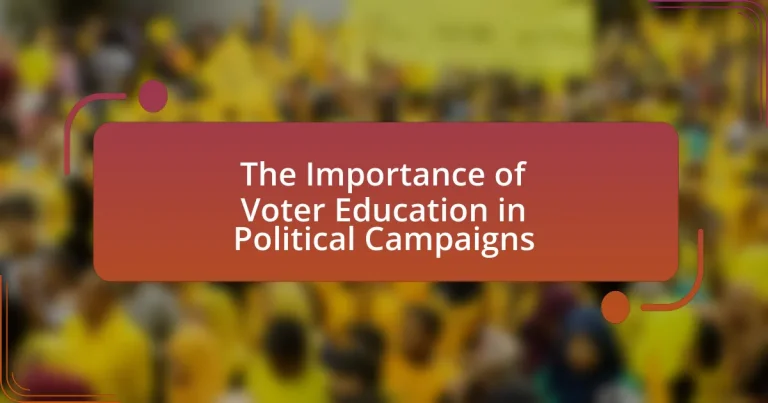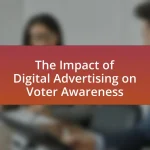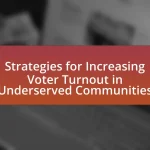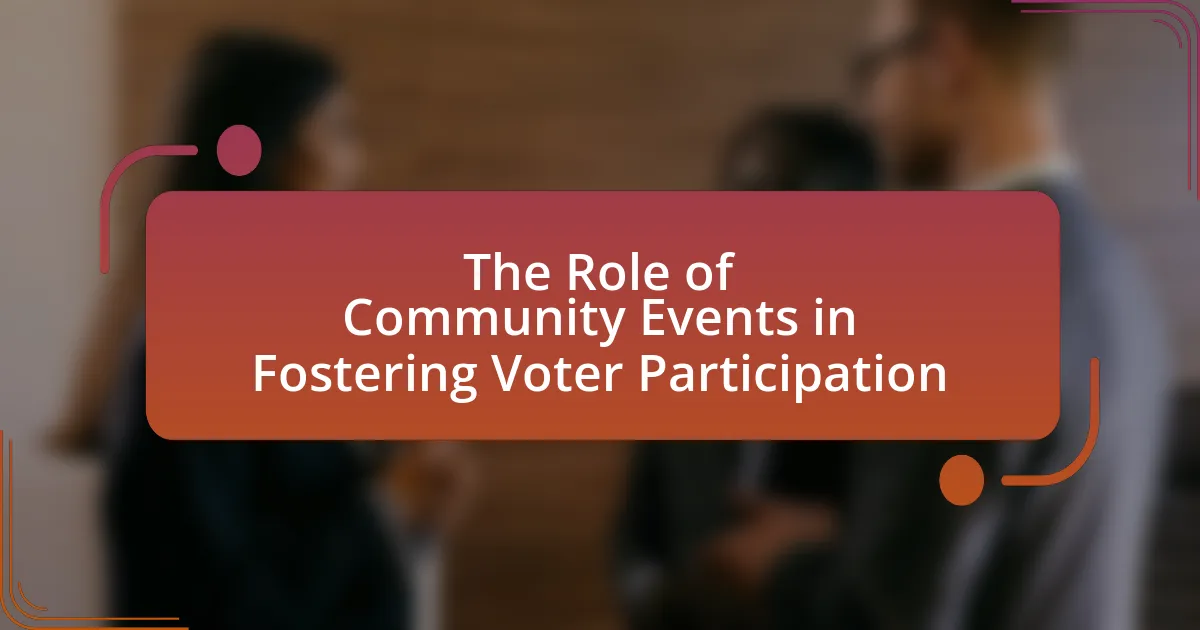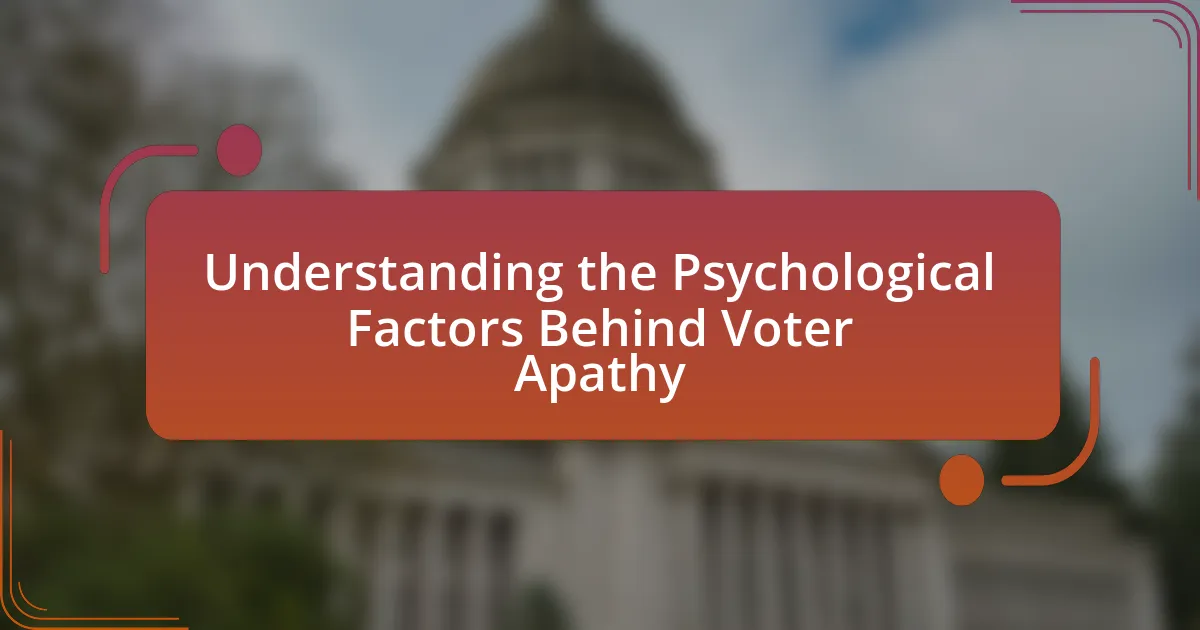The main entity of the article is voter education in political campaigns. Voter education is essential for empowering citizens to make informed decisions, leading to higher voter turnout and more representative election outcomes. The article discusses the significance of voter education for democratic participation, its impact on election results, and its role in combating misinformation. It outlines effective voter education strategies, the challenges faced in reaching diverse demographics, and the importance of partnerships in enhancing educational efforts. Additionally, it highlights practical tips for improving voter education initiatives to foster a more engaged and informed electorate.
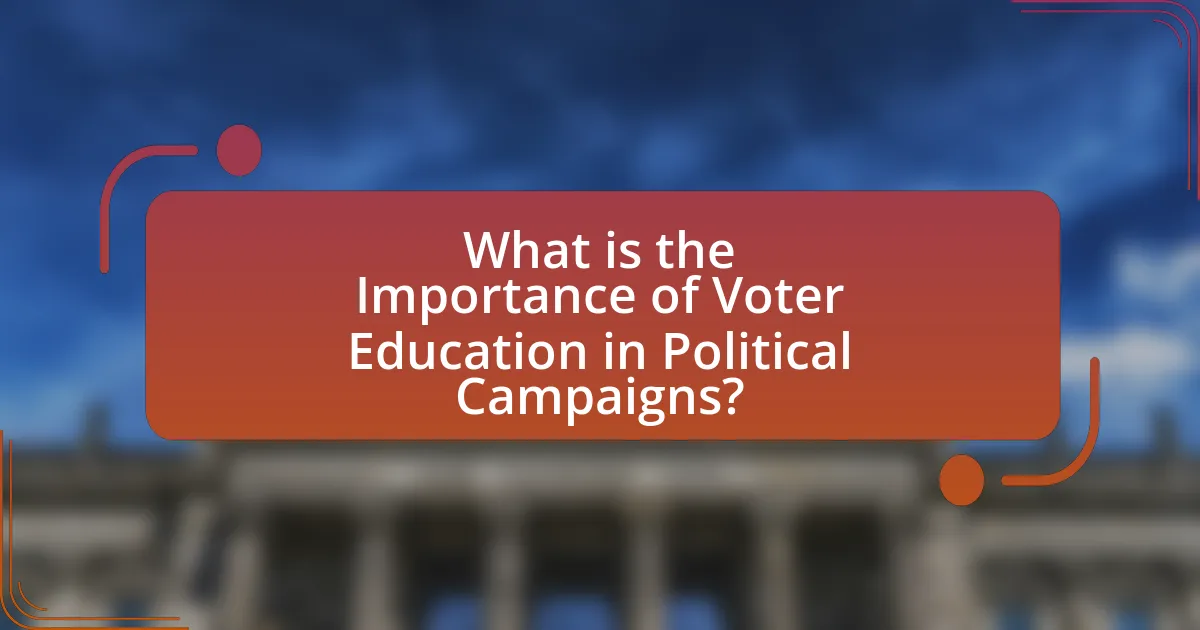
What is the Importance of Voter Education in Political Campaigns?
Voter education is crucial in political campaigns as it empowers citizens to make informed decisions at the polls. Educated voters are more likely to understand candidates’ platforms, the electoral process, and the implications of their choices, leading to higher voter turnout and more representative outcomes. Studies show that informed voters are 20% more likely to participate in elections, as they feel confident in their ability to evaluate candidates and issues. This increased engagement fosters a healthier democracy, where elected officials are held accountable to an informed electorate.
Why is voter education crucial for democratic participation?
Voter education is crucial for democratic participation because it empowers citizens with the knowledge necessary to make informed decisions at the polls. Informed voters are more likely to engage in the electoral process, understand their rights, and evaluate candidates and policies critically. Research indicates that higher levels of voter education correlate with increased voter turnout; for example, the U.S. Census Bureau reported that in the 2020 election, 66.8% of eligible voters participated, a significant increase attributed to enhanced voter education efforts. Thus, effective voter education fosters a more engaged electorate, ultimately strengthening democracy.
How does informed voting impact election outcomes?
Informed voting significantly impacts election outcomes by ensuring that voters make decisions based on accurate information about candidates and policies. When voters are educated about the issues at stake, they are more likely to support candidates who align with their values and interests, leading to election results that reflect the true preferences of the electorate. Studies have shown that higher levels of voter knowledge correlate with increased voter turnout and engagement, which can sway close elections. For instance, research from the Pew Research Center indicates that informed voters are more likely to participate in elections, thereby influencing the overall democratic process and ensuring that elected officials are representative of the population’s informed choices.
What role does voter education play in reducing misinformation?
Voter education plays a crucial role in reducing misinformation by equipping individuals with accurate information about the electoral process, candidates, and issues. When voters are informed, they are less likely to fall prey to false narratives and misleading claims. Research indicates that informed voters can critically evaluate information sources, leading to a decrease in the spread of misinformation. For instance, a study by the Pew Research Center found that individuals who engage in voter education initiatives are more likely to recognize and reject false information, thereby fostering a more informed electorate.
What are the key components of effective voter education?
The key components of effective voter education include clear information dissemination, accessibility of resources, and engagement strategies. Clear information dissemination ensures that voters understand their rights, the voting process, and the significance of their participation. Accessibility of resources involves providing materials in multiple languages and formats to cater to diverse populations, ensuring that all voters can easily access the information they need. Engagement strategies, such as community outreach and interactive workshops, foster a deeper understanding of the electoral process and encourage active participation. Research indicates that informed voters are more likely to participate in elections, highlighting the importance of these components in enhancing voter turnout and civic engagement.
What methods are used to educate voters about the electoral process?
Various methods are employed to educate voters about the electoral process, including public outreach campaigns, educational workshops, and online resources. Public outreach campaigns often utilize advertisements, social media, and community events to disseminate information about voting procedures, deadlines, and the importance of participation. Educational workshops, often organized by civic organizations or local governments, provide hands-on training on how to register, vote, and understand ballot measures. Online resources, such as official election websites and nonpartisan voter information platforms, offer accessible information regarding voting rights, polling locations, and candidate positions. These methods collectively aim to enhance voter awareness and engagement, ultimately fostering a more informed electorate.
How do different demographics respond to voter education initiatives?
Different demographics respond to voter education initiatives in varied ways, influenced by factors such as age, ethnicity, and socioeconomic status. For instance, younger voters often engage more actively with digital voter education campaigns, as evidenced by a study from the Pew Research Center, which found that 70% of individuals aged 18-29 use social media for political information. In contrast, older demographics may prefer traditional methods, such as community meetings or printed materials, reflecting a study by the AARP that indicated 60% of seniors favor in-person interactions for learning about voting. Additionally, minority groups often respond positively to culturally tailored voter education initiatives, as shown in research by the National Association of Secretaries of State, which reported increased voter turnout among Hispanic and Black communities when educational materials were provided in their native languages and culturally relevant contexts. Thus, understanding these demographic differences is crucial for designing effective voter education initiatives.
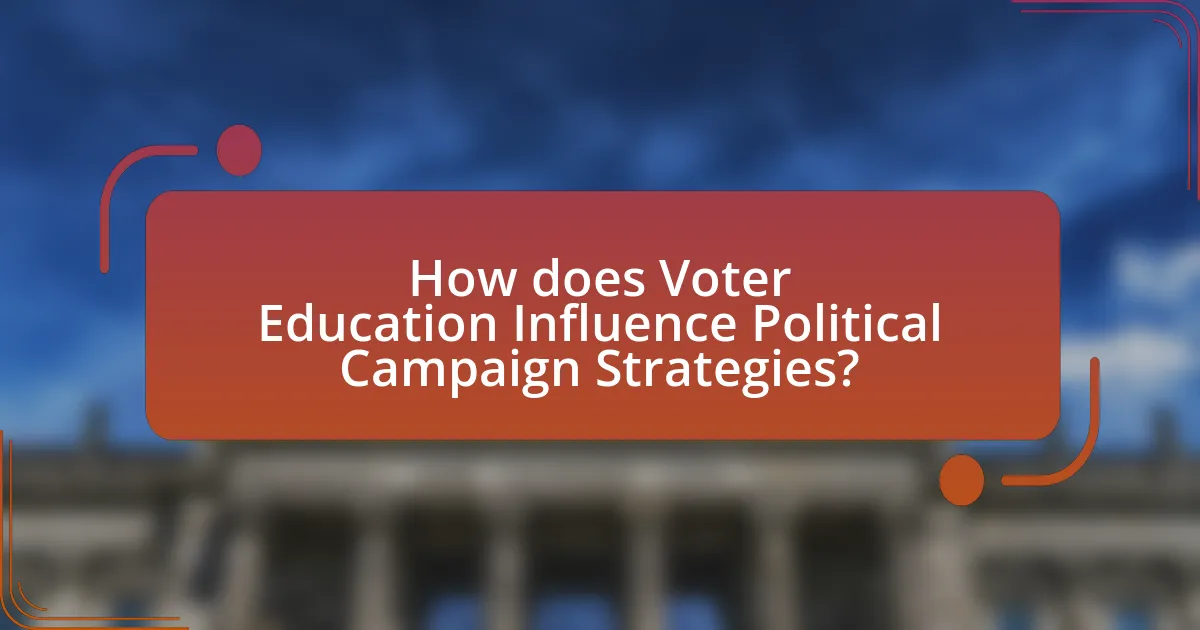
How does Voter Education Influence Political Campaign Strategies?
Voter education significantly influences political campaign strategies by shaping candidate messaging and outreach efforts. When voters are well-informed about issues, candidates tailor their platforms to address specific concerns and priorities, ensuring relevance and resonance with the electorate. For instance, research from the Pew Research Center indicates that educated voters are more likely to engage in the electoral process, prompting campaigns to invest in educational initiatives to mobilize these individuals. Consequently, campaigns often utilize targeted advertisements, community forums, and social media to disseminate information, thereby enhancing voter knowledge and participation. This strategic alignment between voter education and campaign tactics ultimately drives voter turnout and influences election outcomes.
What strategies do political campaigns use to educate voters?
Political campaigns use various strategies to educate voters, including targeted advertising, community outreach, and digital engagement. Targeted advertising allows campaigns to deliver tailored messages to specific demographics, ensuring that voters receive relevant information about candidates and issues. Community outreach initiatives, such as town hall meetings and voter registration drives, facilitate direct interaction between candidates and constituents, fostering informed discussions. Digital engagement through social media platforms and campaign websites provides voters with easy access to information, enabling them to research candidates and policies at their convenience. These strategies are supported by data indicating that informed voters are more likely to participate in elections, as evidenced by studies showing increased voter turnout among those who engage with educational content during campaigns.
How do campaigns tailor their messages for different voter groups?
Campaigns tailor their messages for different voter groups by analyzing demographic data and understanding the specific concerns and values of each group. For instance, campaigns may focus on economic issues for working-class voters, while emphasizing social justice for younger voters. This targeted messaging is supported by research indicating that personalized communication increases voter engagement; a study by the Pew Research Center found that 70% of voters respond positively to messages that resonate with their personal experiences and beliefs. By utilizing data analytics and voter segmentation, campaigns effectively craft messages that align with the priorities of diverse voter demographics.
What role does social media play in voter education during campaigns?
Social media serves as a crucial platform for voter education during campaigns by disseminating information rapidly and engaging a diverse audience. It enables candidates and organizations to share their policies, campaign messages, and important voting information directly with voters. According to a Pew Research Center study, 69% of adults in the U.S. use social media, making it an effective tool for reaching a large segment of the population. Furthermore, social media facilitates interactive discussions, allowing voters to ask questions and receive immediate responses, which enhances their understanding of the electoral process and candidates’ positions. This dynamic interaction is supported by data showing that voters who engage with campaign content on social media are more likely to feel informed and motivated to participate in elections.
How can voter education enhance civic engagement?
Voter education enhances civic engagement by equipping citizens with the knowledge necessary to participate effectively in the democratic process. When individuals understand their rights, the voting process, and the implications of their choices, they are more likely to engage in discussions, mobilize their communities, and ultimately vote. Research indicates that informed voters are 20% more likely to participate in elections compared to those who lack knowledge about the electoral process. This correlation underscores the importance of voter education initiatives in fostering a more active and informed electorate.
What are the long-term benefits of educating voters for future elections?
Educating voters for future elections leads to increased civic engagement and informed decision-making. When voters are educated, they are more likely to participate in elections, which can result in higher voter turnout rates. For instance, studies have shown that informed voters are 20% more likely to vote compared to those who lack knowledge about the electoral process. Additionally, educated voters tend to make choices based on policy issues rather than party affiliation, fostering a more representative democracy. This shift can lead to elected officials who are more accountable to their constituents, as they are elected based on informed preferences rather than misinformation or apathy.
How does voter education foster a more informed electorate?
Voter education fosters a more informed electorate by providing individuals with essential knowledge about the electoral process, candidates, and issues at stake. This education equips voters with the information needed to make informed decisions, thereby enhancing their ability to engage meaningfully in the democratic process. Studies show that informed voters are more likely to participate in elections and understand the implications of their choices, leading to higher voter turnout and more representative outcomes. For instance, research by the Pew Research Center indicates that voters who receive education about the voting process are significantly more likely to vote compared to those who do not.
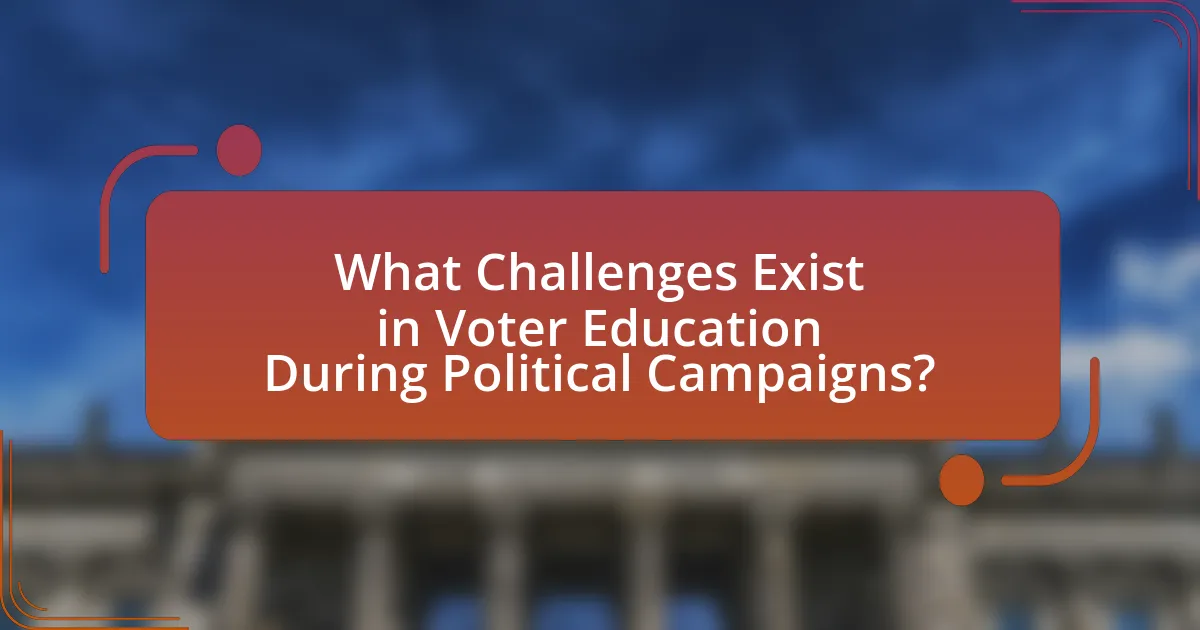
What Challenges Exist in Voter Education During Political Campaigns?
Challenges in voter education during political campaigns include misinformation, lack of access to reliable information, and varying levels of civic engagement among the electorate. Misinformation can spread rapidly through social media, leading to confusion about candidates and policies. A study by the Pew Research Center found that 64% of Americans believe fabricated news stories cause a great deal of confusion about the basic facts of current events. Additionally, many voters may not have access to comprehensive resources or may struggle to navigate complex electoral processes, which can hinder informed decision-making. Furthermore, disparities in civic engagement, often influenced by socioeconomic factors, can result in unequal levels of awareness and participation in the electoral process.
What obstacles do organizations face in providing voter education?
Organizations face several obstacles in providing voter education, including limited funding, misinformation, and accessibility issues. Limited funding restricts the ability to create comprehensive educational materials and outreach programs, as evidenced by a report from the National Association of Secretaries of State, which highlights that many organizations operate on tight budgets. Misinformation complicates the educational landscape, as false narratives can spread rapidly, undermining trust in legitimate sources. Accessibility issues arise when educational resources are not available in multiple languages or formats, making it difficult for diverse populations to engage effectively. These challenges collectively hinder the effectiveness of voter education initiatives.
How does funding affect voter education initiatives?
Funding significantly impacts voter education initiatives by determining the scope, reach, and effectiveness of the programs. Adequate financial resources enable organizations to develop comprehensive educational materials, conduct outreach campaigns, and utilize various media platforms to inform voters. For instance, a study by the Brennan Center for Justice found that states with higher funding for voter education programs saw increased voter turnout, highlighting the correlation between funding levels and voter engagement. Thus, sufficient funding is essential for creating impactful voter education initiatives that can effectively inform and mobilize the electorate.
What are the challenges of reaching underserved communities?
Reaching underserved communities presents significant challenges, primarily due to barriers such as lack of access to information, limited resources, and systemic inequalities. These communities often experience lower levels of internet connectivity, which hinders access to online voter education resources. According to the Pew Research Center, 25% of adults in low-income households do not have access to the internet, limiting their ability to engage with political content. Additionally, language barriers and cultural differences can impede effective communication and outreach efforts. Furthermore, historical disenfranchisement and mistrust in political systems contribute to apathy and disengagement among these populations, making it difficult to mobilize them for voter education initiatives.
How can these challenges be overcome?
To overcome challenges in voter education during political campaigns, targeted outreach strategies must be implemented. These strategies include utilizing social media platforms to disseminate accurate information, engaging community organizations to reach diverse populations, and providing accessible resources in multiple languages. Research indicates that campaigns employing these methods can increase voter awareness and participation; for instance, a study by the Pew Research Center found that 60% of voters reported using social media to gather information about candidates and issues. By focusing on these approaches, campaigns can effectively address barriers to voter education and enhance civic engagement.
What best practices can be implemented to improve voter education efforts?
To improve voter education efforts, implementing targeted outreach strategies is essential. These strategies include utilizing social media platforms to disseminate accurate information, conducting community workshops to engage voters directly, and collaborating with local organizations to reach diverse populations. Research indicates that targeted outreach can increase voter participation; for instance, a study by the U.S. Census Bureau found that individuals who received information through community-based initiatives were 20% more likely to vote compared to those who did not. Additionally, providing clear, accessible resources about the voting process, such as how to register and where to vote, further enhances voter understanding and engagement.
How can partnerships enhance the effectiveness of voter education campaigns?
Partnerships can enhance the effectiveness of voter education campaigns by leveraging diverse resources, expertise, and networks to reach a broader audience. Collaborating organizations can combine their strengths, such as funding, outreach capabilities, and specialized knowledge, to create more comprehensive and impactful educational materials. For instance, a partnership between local nonprofits and educational institutions can facilitate workshops that address specific community needs, thereby increasing engagement and understanding of the voting process. Research indicates that campaigns utilizing partnerships can increase voter turnout by as much as 20%, demonstrating the tangible benefits of collaborative efforts in voter education.
What are practical tips for improving voter education in campaigns?
Practical tips for improving voter education in campaigns include utilizing clear and accessible communication, engaging with diverse community groups, and leveraging digital platforms for outreach. Clear communication ensures that voters understand key issues and candidates’ positions, while engaging with community groups fosters trust and addresses specific concerns. Digital platforms, such as social media and websites, can disseminate information quickly and reach a broader audience, enhancing overall voter awareness. Research indicates that campaigns employing these strategies see increased voter engagement and informed decision-making, as evidenced by studies showing that targeted outreach can significantly boost voter turnout.
